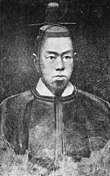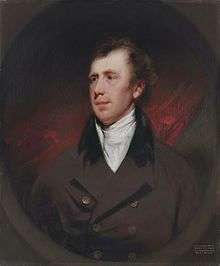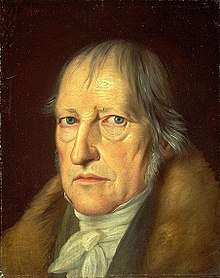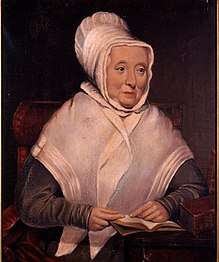1831
1831 (MDCCCXXXI) was a common year starting on Saturday of the Gregorian calendar and a common year starting on Thursday of the Julian calendar, the 1831st year of the Common Era (CE) and Anno Domini (AD) designations, the 831st year of the 2nd millennium, the 31st year of the 19th century, and the 2nd year of the 1830s decade. As of the start of 1831, the Gregorian calendar was 12 days ahead of the Julian calendar, which remained in localized use until 1923.
| Millennium: | 2nd millennium |
|---|---|
| Centuries: | |
| Decades: | |
| Years: |
| 1831 in topic |
|---|
| Humanities |
|
Archaeology – Architecture – Art Literature – Music |
| By country |
| Australia – Belgium – Brazil – Canada – Denmark – France – Germany – Mexico – New Zealand – Norway – Philippines – Portugal – Russia – South Africa – Spain – Sweden – United Kingdom – United States – Venezuela |
| Other topics |
| Rail transport – Science – Sports |
| Lists of leaders |
| Sovereign states – State leaders – Territorial governors – Religious leaders |
| Birth and death categories |
| Births – Deaths |
| Establishments and disestablishments categories |
| Establishments – Disestablishments |
| Works category |
| Works |
| Gregorian calendar | 1831 MDCCCXXXI |
| Ab urbe condita | 2584 |
| Armenian calendar | 1280 ԹՎ ՌՄՁ |
| Assyrian calendar | 6581 |
| Balinese saka calendar | 1752–1753 |
| Bengali calendar | 1238 |
| Berber calendar | 2781 |
| British Regnal year | 1 Will. 4 – 2 Will. 4 |
| Buddhist calendar | 2375 |
| Burmese calendar | 1193 |
| Byzantine calendar | 7339–7340 |
| Chinese calendar | 庚寅年 (Metal Tiger) 4527 or 4467 — to — 辛卯年 (Metal Rabbit) 4528 or 4468 |
| Coptic calendar | 1547–1548 |
| Discordian calendar | 2997 |
| Ethiopian calendar | 1823–1824 |
| Hebrew calendar | 5591–5592 |
| Hindu calendars | |
| - Vikram Samvat | 1887–1888 |
| - Shaka Samvat | 1752–1753 |
| - Kali Yuga | 4931–4932 |
| Holocene calendar | 11831 |
| Igbo calendar | 831–832 |
| Iranian calendar | 1209–1210 |
| Islamic calendar | 1246–1247 |
| Japanese calendar | Tenpō 2 (天保2年) |
| Javanese calendar | 1758–1759 |
| Julian calendar | Gregorian minus 12 days |
| Korean calendar | 4164 |
| Minguo calendar | 81 before ROC 民前81年 |
| Nanakshahi calendar | 363 |
| Thai solar calendar | 2373–2374 |
| Tibetan calendar | 阳金虎年 (male Iron-Tiger) 1957 or 1576 or 804 — to — 阴金兔年 (female Iron-Rabbit) 1958 or 1577 or 805 |
| Wikimedia Commons has media related to 1831. |

July 21: Coronation of Leopold I of Belgium
Events
January–March
- January 1 – William Lloyd Garrison begins publishing The Liberator, an antislavery newspaper, in Boston, Massachusetts.
- February–March – Revolts in Modena, Parma and the Papal States are put down by Austrian troops.
- February 2 – Pope Gregory XVI succeeds Pope Pius VIII, as the 254th pope.
- February 5 – Dutch naval lieutenant Jan van Speyk blows up his own gunboat in Antwerp, rather than strike his colours on the demand of supporters of the Belgian Revolution.
- February 7 – The Belgian Constitution of 1831 is approved by the National Congress.
- February 14 – Battle of Debre Abbay: Ras Marye of Yejju marches into Tigray, and defeats and kills the warlord Sabagadis.
- February 20 – Battle of Olszynka Grochowska (Grochow): Polish rebel forces divide a Russian army.
- March 10 – The French Foreign Legion is founded.
- March 16 – The Hunchback of Notre-Dame (Notre-Dame de Paris) is first published by Victor Hugo.
- March 29 – The Bosnian Uprising against the Ottoman Empire begins.
April–June
- April 7 – Pedro I abdicates as Emperor of Brazil in favor of his 5-year-old son Pedro II, who will reign for almost 59 years.
- April 18 – The University of Alabama is founded.
- April 27 – Charles Albert becomes king of Sardinia, after the death of King Charles Felix.
- May 26 – Battle of Ostrołęka: The Poles fight another indecisive battle.
- May 31 – Auxiliary paddle steamer Sophia Jane arrives at Sydney from London, becoming the first steamboat to operate in the coastal waters of New South Wales.
- May–June – Merthyr Rising: Coal miners and others riot in Merthyr Tydfil, Wales for improved working conditions.
- June 1 – British Royal Navy officer James Clark Ross locates the position of the North Magnetic Pole, on the Boothia Peninsula.
- June 21 – The North Carolina State House and Canova's George Washington are destroyed by fire in Raleigh, North Carolina.[1]
July–September
- July 13 – Russian imperial officials in Wallachia adopt Regulamentul Organic, introducing a period of unprecedented reforms that provide for Westernization of this region of Romania.
- July 15 – The volcanic Graham Island briefly emerges in the Mediterranean.
- July 21 – Leopold of Saxe-Coburg-Gotha is inaugurated as the first King of the Belgians, in Brussels.
- August 2 – The Dutch Ten Days' Campaign against Belgium is halted by a French army.
- August 7 – American Baptist minister William Miller preaches his first sermon on the Second Advent of Christ in Dresden, New York, launching the Advent Movement in the United States.
- August 21 – Nat Turner's slave rebellion in the United States breaks out in Southampton County, Virginia.
- September 6–8 – Battle of Warsaw: The Russians take the Polish capital and crush resistance.
- September 8 – Coronation of King William IV of the United Kingdom (he will reign until 1837).
- September 26–28: The first national presidential nominating convention is held in the United States, by the Anti-Masonic Party, in Baltimore, Maryland.
October–December
- October 9 – Ioannis Kapodistrias, Greek head of state and founder of Greek independence, is assassinated in Nafplion.
- October 29 – The Queen Square riots, Bristol (England) begin, in response to the UK parliament's decision not to reform the franchise. The military are called in to assist in the suppression and delays are caused to construction of the Clifton Suspension Bridge.
- October 30 – In Southampton County, Virginia, escaped slave Nat Turner is captured and arrested for leading the bloodiest slave rebellion in United States history.
- November 7 – Slave trading is forbidden in Brazil.
- November 17 – Ecuador and Venezuela are separated from Gran Colombia.
- November 22 – First Canut Revolt: After a bloody battle with the military causing 600 casualties, rebellious silk workers seize Lyon, France.
- December 26 – An Italy based global financial service, Assicurazioni Generali was founded, as predecessor name was Assicurazioni Generali Austro-Italiche.
- December 27
- The Christmas Rebellion begins in Jamaica, with the setting afire of the Kensington House in St James Parish, inspiring thousands of black slaves to revolt against their English masters. At its peak, more than 20,000 people will be involved, and more than 500 killed.[2]
- Charles Darwin embarks from Plymouth on his historic voyage aboard HMS Beagle.
- December 31 – Gramercy Park is deeded to New York City.
Date unknown
- The Sydney Morning Herald newspaper is first published.
- Wallinska skolan, the first secondary education school for girls in the Swedish capital of Stockholm, is founded.
- Muhammad Ali of Egypt's French-trained forces occupy Syria.
- Rifa'a al-Tahtawi returns from study in Paris to Egypt.
- Founding of:
- Denison University in Granville, Ohio
- Wesleyan University in Middletown, Connecticut
- New York University in New York City
- Xavier University in Cincinnati (as "The Athenaeum")
- Japanese department store, Takashimaya in Kyoto on January
Births
January–June
- January 3 – Savitribai Jyotirao Phule, Indian social reformer, poet (d. 1897)
- January 7 – Heinrich von Stephan, German postal union organizer (d. 1897)
- January 11 – Pope Cyril V of Alexandria (d. 1927)
- January 26 – Heinrich Anton de Bary, German botanist, mycologist (d. 1888)
- February 12 – Myra Bradwell, American lawyer, political activist (d. 1894)
- February 24 – Leo von Caprivi, Chancellor of Germany (d. 1899)
- March 3
- Gioacchino La Lomia, Italian Roman Catholic priest and venerable (d. 1905)
- George Pullman, American inventor and industrialist (d. 1897)
- March 6 – Philip Sheridan, American general (d. 1888)
- March 12 – Clement Studebaker, American automobile pioneer (d. 1901)
- March 16 – Elise Hwasser, Swedish actress (d. 1894)
- May 7 – Richard Norman Shaw, British architect (d. 1912)
- June 1 – John Bell Hood, American Confederate general (d. 1879)
- June 2 – Jan Gerard Palm, Curaçao-born composer (d. 1906)
- June 7 – Amelia Edwards, English journalist and author (d. 1892)[3]
- June 13 – James Clerk Maxwell, Scottish physicist (d. 1879)
- June 28 – Joseph Joachim, Austrian violinist (d. 1907)
July–December
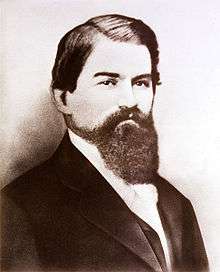
John Pemberton

Lucy Hayes
- July 8 – John Pemberton, American inventor of Coca-Cola (d. 1888)
- July 9 – Wilhelm His, Sr., Swiss anatomist (d. 1904)
- July 17 – Xianfeng Emperor of China (d. 1861)
- July 22 – Emperor Kōmei of Japan (d. 1867)
- August 12 – Helena Blavatsky, Russian-born author, theosophist (d. 1891)
- August 16 – Ebenezer Cobb Morley, English sportsman and the father of modern football (d. 1924)
- August 20 – Eduard Suess, Austrian geologist (d. 1914)
- August 28 – Lucy Webb Hayes, First Lady of the United States (d. 1889)
- September 3 – States Rights Gist, Confederate Brigadier General in the American Civil War (d. 1864)
- September 8 – Wilhelm Raabe, German novelist (d. 1910)
- September 18 – Siegfried Marcus, German-born automobile pioneer (d. 1898)
- September 20 – Kate Harrington, American teacher, writer and poet (d. 1917)
- September 29 – John Schofield, American general (d. 1906)
- October 6 – Richard Dedekind, German mathematician (d. 1916)
- October 14 – Samuel W. Johnson, British railway engineer (d. 1912)
- October 16 – Lucy Stanton, American abolitionist (d. 1910)
- October 18 – Frederick III, German Emperor (d. 1888)
- October 29 – Othniel Charles Marsh, American paleontologist (d. 1899)
- October 31
- Paolo Mantegazza, Italian neurologist, physiologist, anthropologist, and author of fiction (d. 1910)
- Romualdo Pacheco, Governor of California (d. 1899)
- November 1 – Sir Harry Atkinson, 10th Premier of New Zealand (d. 1892)
- November 5 – Anna Leonowens (Anna of The King and I) (d. 1915)
- November 7 – Mélanie Calvat, French Roman Catholic nun, Marian Visionary and saint (d. 1904)
- November 19 – James A. Garfield, 20th President of the United States (d. 1881)
- December 14 – Arsenio Martínez Campos, Spanish general, revolutionary, and Prime Minister of Spain (d. 1900)
- December 19 – Bernice Pauahi Bishop, Hawaiian aliʻi (d. 1884)
Date unknown
- Jacob W. Davis, (b. Jacob Youphes), Latvian-born American tailor, inventor of jeans (d. 1908)
- Sotirios Sotiropoulos, Greek economist, politician (d. 1898)
- Eugenia Kisimova, Bulgarian feminist, philanthropist, women's rights activist (d. 1885)
Deaths
January–June

Ludwig Achim von Arnim
- January 8 – Franz Krommer, Czech composer (b. 1759)
- January 21 – Ludwig Achim von Arnim, German poet (b. 1781)
- February 2 – Vincenzo Dimech, Maltese sculptor (b. 1768)
- February 14
- Vicente Guerrero, 2nd President of Mexico, Independence War hero (b. 1782)
- Marye of Yejju, Ethiopian Ras
- Sabagadis, Ethiopian warlord (b. c. 1770)
- February 17 – Friedrich Wilhelm, Duke of Schleswig-Holstein-Sonderburg-Glücksburg (b. 1785)
- February 25 – Friedrich Maximilian Klinger, German writer (b. 1752)
- April 5 – Dmitry Senyavin, Russian admiral (b. 1763)
- April 20 – John Abernethy, English surgeon (b. 1764)
- April 21 – Thursday October Christian I, Pitcairn Islander and son of Fletcher Christian (b. 1790)
- April 27 – Charles Felix of Sardinia, King of Sardinia (b. 1765)
- April 30 – Collet Barker, British military officer, explorer (b. 1784)
- May 17 – Nathaniel Rochester, American politician (b. 1752)
- June 5 – Tarenorerer, indigenous Australian Tasman freedom fighter (b. 1800)
- June 6 – Robert Fullerton, governor of Penang, first governor of British Straits Settlements (b. 1773)
- June 8 – Sarah Siddons, English actress (b. 1755)
- June 27 – Sophie Germain, French mathematician (b. 1776)
- June 30 – William Roscoe, British writer (b. 1753)
July–December
- July 4 – James Monroe, 73, 5th President of the United States (b. 1758)
- July 16 – Louis Alexandre Andrault de Langeron, Russian general (b. 1763)
- July 20 – Jacques Defermon des Chapelieres, French politician (b. 1752)
- August 5 – Sébastien Érard, German-born French instrument maker (b. 1752)
- August 24 – August von Gneisenau, Prussian field marshal (b. 1760)
- September 28 – Philippine Engelhard, German writer, scholar (b. 1756)
- November 6 – Hilchen Sommerschild, Norwegian educator (b. 1756)
- November 11 – Nat Turner, American slave rebel (b. 1800)
- November 14 – Georg Hegel, German philosopher (b. 1770)
- November 16 – Carl von Clausewitz, German military strategist (b. 1780)
- November 21 – Marie Anne Simonis, Belgian textile industrialist (b. 1758)
- December 15 – Hannah Adams, American author (b. 1755)
- December 18 – Willem Bilderdijk, Dutch author (b. 1756)
- December 23 – Emilia Plater, Polish heroine (b. 1806)
- December 26
- Henry Louis Vivian Derozio, Indian poet (b. 1809)
- Stephen Girard, French-American banker (b. 1750)
Date unknown
- Marengo, Napoleon's mount in several battles (b. 1793)
- Charlotta Richardy, Swedish industrialist (b. 1751)
gollark: I agree.
gollark: "people do not agree with me, therefore we live in a simulation"
gollark: cyber fails at empathy, 2021 colorized.
gollark: Of course.
gollark: The truth cuboids (which are right) disagree.
References
- Miskimon, Scott A. (2010). "The Fires of 1831: Fayetteville and Raleigh in Flames". State Library of North Carolina.
- Drainville, Andre C. (2013). A History of World Order and Resistance: The Making and Unmaking of Global Subjects. Routledge.
- Benjamin F. Fisher IV (1985). "Amelia B. Edwards". In Bleiler, E. F. (ed.). Supernatural Fiction Writers. New York: Scribner's. p. 255. ISBN 0-684-17808-7.
This article is issued from Wikipedia. The text is licensed under Creative Commons - Attribution - Sharealike. Additional terms may apply for the media files.



